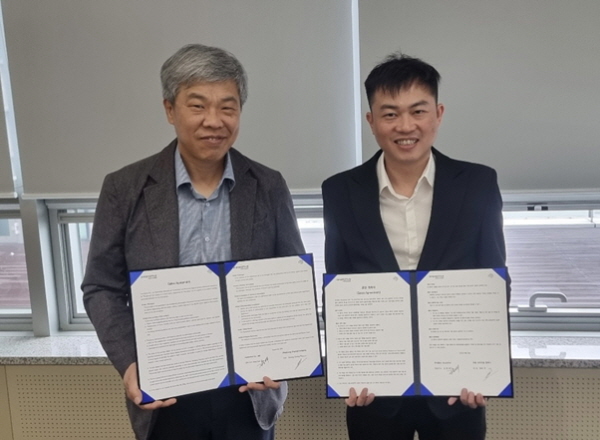이노모티브가 베트남 기업과 배터리 교환식 마이크로 모빌리티 서비스 플랫폼 공급 계약을 체결하며 아세안 시장 진출로의 힘찬 발걸음을 내딛었다.

▲왼쪽부터 김종배 이노모티브 대표, 동광푸우 푸동 오리지널 컴퍼니 대표 (사진제공: 이노모티브)
글로벌 경쟁력 갖춘 중소기업 중심 미래차 부품 기업들과 사업화 추진
1단계 시범 사업 160만불 규모 계약 체결…올 11월부터 서비스 예정
이노모티브가 베트남 기업과 배터리 교환식 마이크로 모빌리티 서비스 플랫폼 공급 계약을 체결하며 아세안 시장 진출로의 힘찬 발걸음을 내딛었다.
교환형 스마트 배터리 팩 중심의 특수 목적 친환경차 전기차(PBV) 플랫폼 기업인 이노모티브는 베트남 PHU DUONG ORIGINAL COMPANY LIMITED (CEO DuongQuang Phu)사와 총 160만달러 규모의 시범 사업에 최종 합의서를 교환했다고 28일 전했다.
지난 6월21일 베트남 호치민에서 개최된 자동차 부품 전시회에 참가해 광주그린카진흥원의 ‘수요기반 협력사 밸류체인 고도화 및 자립화 패키지 지원사업’의 일환으로 현지 사업자와 기본 협약을 맺은 이후 체결하는 본 계약이다.
유명 휴양지인 다낭을 중심으로 객실수 65만개를 가진 3만여 베트남 리조트의 현지 관리용 다목적 전기차(한국에서는 “농용동력운반차”로 분류)를 공급하려던 것을 단일화된 배터리 팩을 이용해 현지 관광택시, 전기 이륜차, 화물 이동용 저속 운반 수단 등으로 지원 범위를 확대키로 했다.
오는 11월 말까지 최종 시범 사업 지역을 세 곳 선정하고, 한 곳당 약 53만4,000달러를 투입해 태양광 발전과 연계한 배터리 교환 충전소 및 시범용 차량 등을 공급한다.
시범 사업은 2024년 2월까지 진행하며, 시범 사업을 통해 확보한 실증 데이터를 기반으로 현지에 적합하도록 플랫폼을 개선한 후, 본 사업을 추진한다는 목표다.
베트남 현지 기업인 PHU DUONG사는 시범 사업 지역 선정 및 현장 설치와 운영을 담당하고, 이노모티브는 배터리 교환식 다목적 전기차와 배터리 충전 스테이션 등을 공급과 동시에 현지에서의 서비스 플랫폼 운영 관련 기술을 이전한다.
현재 검토 중인 시범 사업지는 △해안 중심 관광도시 육성을 적극 추진 중인 빈투언성 △고산 지대인 달랏 휴양지를 가진 럼동성 △한국에도 잘 알려진 대표적인 휴양 도시 다낭 등으로 알려지고 있으나, 다른 지역에서도 같이 사업화를 추진해보다는 문의가 이어지고 있다는 베트남 측 현지 반응에 푸동 대표는 놀라고 있다고 말했다.
2024년 2월 시범 사업을 마치면 하반기에는 베트남 현지 생산을 위한 설비도 마련할 예정이며 최종적으로 아세안 시장 진출이 최종 목표로 연간 2만대 생산 규모(약 1억달러 규모)의 투자를 적극 검토하기로 했다.
지난 6월 베트남 전시회 방문 이후, 8월에는 사업화를 희망하는 여러 지방 정부를 순회하며 직접 챙기는 등 VKBIA(베한기업인협회, 회장 쩐 하이린)는 베트남 현지 지방 정부와 기업, 그리고 한국의 우수한 기술력을 가진 전문 기업들을 상호 연결해주고 있다.
광주그린카진흥원 역시 이번 시범 사업을 적극적으로 지원하고 있으며 한국생산기술연구원고 함께 글로벌 경쟁력을 갖춘 수평적 전기차 생태계를 조성하기 위해 노력하고 있다.
김종배 이노모티브 대표는 “베트남을 비롯한 아세안 시장은 우리에게 가장 중요한 목표 시장이며,이륜차가 수억 대 보급된 시장에서의 가능성이 아닌 실질적인 사업화 결과를 토대로 최적화된 플랫폼을 공급하기 위해 이번 시범 사업이 중요한 이유”라고 말했다.
